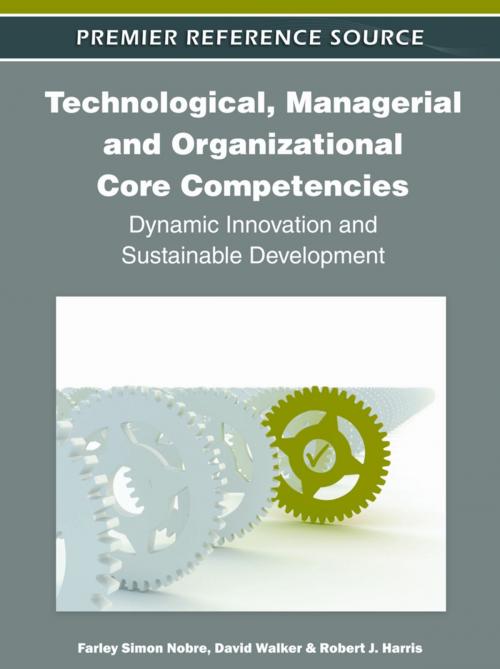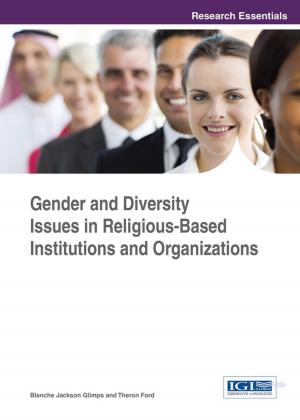Technological, Managerial and Organizational Core Competencies
Dynamic Innovation and Sustainable Development
Business & Finance, Economics, Sustainable Development, Human Resources & Personnel Management, Organizational Behavior| Author: | ISBN: | 9781466605657 | |
| Publisher: | IGI Global | Publication: | September 30, 2011 |
| Imprint: | Business Science Reference | Language: | English |
| Author: | |
| ISBN: | 9781466605657 |
| Publisher: | IGI Global |
| Publication: | September 30, 2011 |
| Imprint: | Business Science Reference |
| Language: | English |
Innovation involves a set of processes which support the production and transformation of knowledge into new processes, technologies and products, goods and services, and provide an organization with particular strengths and value relative to other firms. In such a view, innovation is a key source of customer benefits and sustainable competitive advantage. Technological, Managerial and Organizational Core Competencies: Dynamic Innovation and Sustainable Development investigates the impact of knowledge management, information systems, finance, organizational networks, internationalization, strategic management, marketing, entrepreneurship, and sustainability on an organization that pursues dynamic innovation and sustainable advantage. This book provides research and practice for graduate and undergraduate programs, as well as business firms with different technological, managerial, and organizational perspectives. Further Description from the Editors: This book represents the culmination of an international project to compile inter-disciplinary research that most contributes to innovation. More specifically, this book is about innovation in firms, industries, nations and society. It speaks to professionals and researchers who want to improve their understanding of dynamic innovation and sustainable development. The Editors’ goal is to foster cross-pollination among researchers. To this aim, the Editors have selected and assembled 35 chapters that illustrate multidisciplinary theoretical perspectives and empiric results on innovation and the roles of Sustainability, Organizational Networks, Entrepreneurship, Knowledge Management, R&D&T (Research, Development and Technology) Management, Marketing, Finance, Internationalization, and Information Systems in the organization that pursues dynamic innovation and sustainable development. Innovation involves processes, organizational elements (or resources ), and Organizational Abilities (OA) that support the production and transformation of knowledge into new knowledge, processes, structures, technologies and products, goods and services. At the firm and industry levels of analysis, innovation can provide organizations with strengths relative to other firms, clusters, and nations and it is a key source of customer benefits and sustainable development. At the collective and societal levels of analysis, innovation can provide humanity with economic, social and environmental wealth through sustainable development. The uniqueness of this book lies in the participants’ efforts to identify Organizations' Creative Areas (OCA) that can provide core competencies for the organization in pursuit of dynamic innovation and sustainable development. In this perspective, innovation is a dynamic system and it is contingent upon a set of core competencies that couple to each other. Therefore, changing of even one competence can affect the organization's ability to innovate. The book avoids the term competitive advantage and adopts a more fruitful perspective of sustainable development – “the process of achieving human development … in an inclusive, connected, equitable, prudent, and secure manner”. An inclusive perspective sees traditional competitive advantage as occupying one extreme, whereas truly sustainable development occupies the opposite extreme. Sustainable development must benefit not only the organization and its customers, but also the whole society and the future of humanity through sustainability . Most chapters of this book fall between these extremes.
Innovation involves a set of processes which support the production and transformation of knowledge into new processes, technologies and products, goods and services, and provide an organization with particular strengths and value relative to other firms. In such a view, innovation is a key source of customer benefits and sustainable competitive advantage. Technological, Managerial and Organizational Core Competencies: Dynamic Innovation and Sustainable Development investigates the impact of knowledge management, information systems, finance, organizational networks, internationalization, strategic management, marketing, entrepreneurship, and sustainability on an organization that pursues dynamic innovation and sustainable advantage. This book provides research and practice for graduate and undergraduate programs, as well as business firms with different technological, managerial, and organizational perspectives. Further Description from the Editors: This book represents the culmination of an international project to compile inter-disciplinary research that most contributes to innovation. More specifically, this book is about innovation in firms, industries, nations and society. It speaks to professionals and researchers who want to improve their understanding of dynamic innovation and sustainable development. The Editors’ goal is to foster cross-pollination among researchers. To this aim, the Editors have selected and assembled 35 chapters that illustrate multidisciplinary theoretical perspectives and empiric results on innovation and the roles of Sustainability, Organizational Networks, Entrepreneurship, Knowledge Management, R&D&T (Research, Development and Technology) Management, Marketing, Finance, Internationalization, and Information Systems in the organization that pursues dynamic innovation and sustainable development. Innovation involves processes, organizational elements (or resources ), and Organizational Abilities (OA) that support the production and transformation of knowledge into new knowledge, processes, structures, technologies and products, goods and services. At the firm and industry levels of analysis, innovation can provide organizations with strengths relative to other firms, clusters, and nations and it is a key source of customer benefits and sustainable development. At the collective and societal levels of analysis, innovation can provide humanity with economic, social and environmental wealth through sustainable development. The uniqueness of this book lies in the participants’ efforts to identify Organizations' Creative Areas (OCA) that can provide core competencies for the organization in pursuit of dynamic innovation and sustainable development. In this perspective, innovation is a dynamic system and it is contingent upon a set of core competencies that couple to each other. Therefore, changing of even one competence can affect the organization's ability to innovate. The book avoids the term competitive advantage and adopts a more fruitful perspective of sustainable development – “the process of achieving human development … in an inclusive, connected, equitable, prudent, and secure manner”. An inclusive perspective sees traditional competitive advantage as occupying one extreme, whereas truly sustainable development occupies the opposite extreme. Sustainable development must benefit not only the organization and its customers, but also the whole society and the future of humanity through sustainability . Most chapters of this book fall between these extremes.















